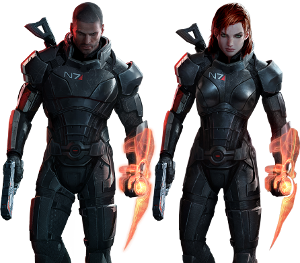
Commander Shepard is the player character in the Mass Effect video game series by BioWare.

The Reapers are a fictional fleet of sentient starships that serve as the main antagonists of the Mass Effect trilogy. The design of the Reapers was inspired by H. P. Lovecraft's Cthulhu Mythos deities. Within the series, the Reapers cause galactic-level mass extinctions every fifty-thousand years. The Reapers and their technology are capable of brainwashing organic life through a mind control process called indoctrination. The Reapers employ servants who are often altered into synthetic-organic life forms.

Mass Effect: Ascension is a science fiction novel by author Drew Karpyshyn. It is a sequel to the video game Mass Effect, as well as to its prequel novel, Mass Effect: Revelation, also written by Karpyshyn. The novel is set approximately two months after the ending events of the first game. While the first book acted as a prequel to the first game, Ascension helps to bridge the gap between the first game and Mass Effect 2.
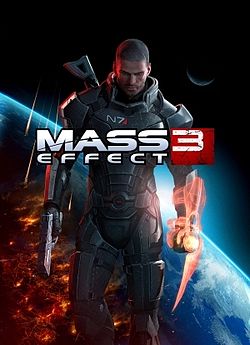
Mass Effect 3 is a 2012 action role-playing video game developed by BioWare and published by Electronic Arts. The third major entry in the Mass Effect series and the final installment of the original trilogy, it was released in March 2012 for Microsoft Windows, Xbox 360, and PlayStation 3. A Wii U version of the game, entitled Mass Effect 3: Special Edition, was later released in November 2012. The game is set within the Milky Way galaxy in 2186, where galactic civilization is invaded by a highly advanced machine race of synthetic-organic starships known as Reapers. It concludes the story of Commander Shepard, an elite human soldier who is tasked with forging alliances between species for the war.

Mass Effect Galaxy was a mobile game for iOS developed by BioWare and published by Microsoft Game Studios. Galaxy follows former Systems Alliance soldier Jacob Taylor as he works with his colleague Miranda Lawson and other allies to foil a terrorist conspiracy against the Citadel Council, an executive committee consisting of several politically dominant species who hold great sway in the galaxy and are recognized as an authority by most of explored space. Both Jacob and Miranda would later appear as recurring characters in the science fiction action role-playing video game series Mass Effect, most notably as companion characters in Mass Effect 2, where they are revealed to be members of the anthropocentric paramilitary organization, Cerberus.
Mass Effect is a military science fiction media franchise created by Casey Hudson. The franchise depicts a distant future where humanity and several alien civilizations have colonized the galaxy using technology left behind by advanced precursor civilizations.
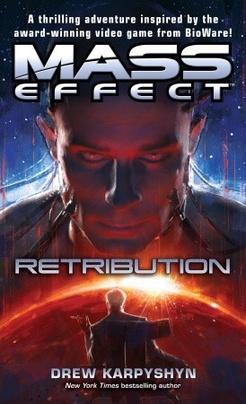
Mass Effect: Retribution is a science fiction novel by Canadian writer Drew Karpyshyn set in the Mass Effect universe. It is a sequel to the video game Mass Effect 2, as well as to its prequel novel, Mass Effect: Ascension, also written by Karpyshyn. Retribution is set directly after the events of Mass Effect 2, and like its predecessors, expands on the Mass Effect universe by fleshing out its setting and providing background on some key characters.
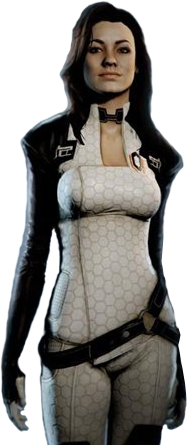
Miranda Lawson is a fictional character in the role-playing video game series Mass Effect by BioWare. In it, Miranda is an officer of the pro-human group Cerberus, first appearing in the 2009 iOS game Mass Effect Galaxy, and then serving as a squad mate in Mass Effect 2. In addition to these, the character also makes an appearance in the Mass Effect: Redemption comic series, in Mass Effect 3 if she survived the events of the suicide mission in Mass Effect 2, and in issues 5, 6, 8 and 9 of the Mass Effect: Foundation comic series. She is revealed to have been genetically designed by her father, Henry Lawson, to be perfect, and ran away from home to join Cerberus.

The Illusive Man is a fictional character in BioWare's Mass Effect video game franchise. He is the leader of the pro-human group Cerberus. The Illusive Man wears an open suit that connotes both futuristic style and the "casual swagger of a charming billionaire". His eye implants make him appear slightly inhuman. He is normally seen in an empty office with no indication of his living arrangements. He is voiced by Martin Sheen.
Kaidan Alenko is a fictional character in BioWare's Mass Effect franchise, who acts as a party member in the first and third games in the series. The character is initially introduced in the original Mass Effect as a human Systems Alliance Officer and primary squad member in Commander Shepard's team. Kaidan's fate on the planet Virmire is part of a pivotal decision which the player has to make in order to advance the narrative.

Thane Krios is a fictional character in BioWare's Mass Effect franchise, who first appeared in Mass Effect 2 as a party member. The character is a drell, a race of extraterrestrial reptilian humanoids who form a sociopolitical alliance with the hanar, a sentient species of jellyfish-like entities. Thane Krios is voiced by Keythe Farley in the video game series.

Jack is a fictional character in the role-playing video game series Mass Effect by BioWare. Jack appears as a squadmate in Mass Effect 2, and may appear in Mass Effect 3 as a supporting character provided she survives the events of the previous game. Jack is voiced by Courtenay Taylor. Within the series, Jack was orphaned at an early age and was kidnapped by the anthropocentric paramilitary group Cerberus to be exploited as a test subject. Designated Subject Zero by Cerberus, she is considered to be one of the most powerful human biotics in existence in the Mass Effect trilogy as the result of unethical experiments conducted by Cerberus to enhance human biotic ability, though her traumatic experiences have molded her into an antisocial and psychopathic individual.
James Vega is a fictional character in BioWare's Mass Effect media franchise, who is a party member in the third game of the series. Within the series, he is a human Systems Alliance Marine holding the rank of lieutenant, and first appears in Mass Effect: Conviction where he is assigned by Systems Alliance Admiral David Anderson to escort series protagonist Commander Shepard, who is en route to an Alliance defense committee hearing in Vancouver. After the Reapers invasion of Earth commences, James joins Shepard and the crew of the Normandy as they depart Earth to rally support from humanity's allies. The character has also appeared in other media, including the first issue of the comic mini-series Mass Effect: Homeworlds, and anime film Mass Effect: Paragon Lost. James Vega is voiced by American actor Freddie Prinze, Jr.
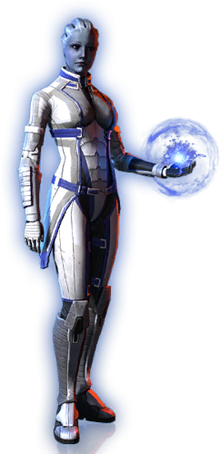
Dr. Liara T'Soni is a fictional character in BioWare's Mass Effect franchise, who serves as a party member in the original Mass Effect trilogy. She is an asari, a female-appearing species from the planet Thessia who are naturally inclined towards biotics, the ability to "manipulate dark energy and create mass effect fields through the use of electrical impulses from the brain". Within the series, Liara is noted for being the galactic scientific community's foremost expert in the field of Prothean archaeology and technology, specifically evidence concerning the demise of the ancient Protheans, believed by the galactic community to be the pre-eminent civilization in the Milky Way galaxy until their sudden disappearance fifty thousands years before the events of the first Mass Effect.

Mass Effect 3: Omega is a major downloadable content (DLC) pack developed by BioWare and published by Electronic Arts for the 2012 action role-playing video game Mass Effect 3. It was released for Microsoft Windows, PlayStation 3, and Xbox 360 on November 27, 2012, with a delayed release in Europe on the PlayStation 3 platform set for November 28, 2012. The pack follows Commander Shepard and the asari pirate queen Aria T'Loak as they attempt to liberate the space station Omega from the anthropocentric terrorist group Cerberus. Omega expanded beyond the developers' original plan during its development cycle, both in response to a mandate of freedom by BioWare management and as a result of the development team's desire to develop the experience they wanted, and incorporates cut content from the main game.

Mass Effect 3: From Ashes is a downloadable content (DLC) pack developed by BioWare and published by Electronic Arts for the 2012 action role-playing video game Mass Effect 3. It was released for Microsoft Windows, PlayStation 3, and Xbox 360 as a standalone download on March 6, 2012, and included with all retail copies of Mass Effect 3: Special Edition for Wii U. Set within the Milky Way galaxy during the 22nd century, From Ashes follows Commander Shepard and the crew of the Normandy as they investigate an attack on the colony of Eden Prime by the anthropocentric terrorist group Cerberus, where a Prothean artifact had recently been unearthed.

The Mass Effect media franchise, developed by BioWare and published by Electronic Arts, is set in the distant future where various extraterrestrial species coexist with humanity. The developers created extensive background lore for the universe of Mass Effect and its alien species, with detailed explanations documenting the complex relationships between the universe's various factions and the setting's phenomena from a scientific perspective. The developers were inspired and influenced by numerous fantasy and science fiction works, as well as real world cultural and scientific concepts. Dark energy, a form of energy theorized to massively affect the universe, forms a key part of the franchise's concept and background.
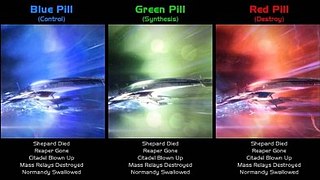
Mass Effect 3 is an action role-playing video game and the third installment of the Mass Effect video game series, developed by BioWare and published by Electronic Arts (EA). Upon its release March 6, 2012 for the PlayStation 3, Xbox 360, and Microsoft Windows, Mass Effect 3 generated controversy when its ending was poorly received by players who felt that it did not meet their expectations. Criticisms included the ending rendering character choices inconsequential, a general lack of closure, plot holes, and narrative inconsistency.

The Citadel is a fictional space station and megastructure in the Mass Effect franchise of video games developed by BioWare. An ancient station supposedly constructed by the long-dead Protheans, it serves as the hub of interstellar politics and society in the Milky Way galaxy due to its status as the capital of the Citadel Council, the dominant galactic polity within the Mass Effect universe. The Citadel was praised by critics for its design, lore, and the diversity of its inhabitants enhancing the game world.















